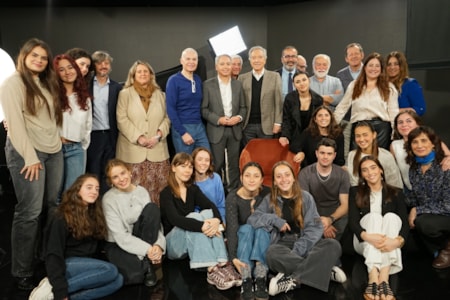
The studio of the
Faculty of Humanities and Communication Sciences was the stage for a new
session of the documentary project "Living Treasures", led by
the Academy of Television Arts and Sciences. This session featured the
well-known journalists Iñaki Gabilondo and Vicente Vallés.
The activity is part
of the CEU-Business – Television Academy Classroom, an academic initiative
directed by Professor Esther Cervera, with active participation from students
in Audiovisual Communication and Journalism degrees. The technical part was
coordinated by Sara Padín, who guided the students through a hands-on,
real-world audiovisual production experience.
During
his talk, Iñaki Gabilondo emphasized that “to be a journalist, it’s important
to care about people,” highlighting the social role of journalism and the
responsibility of the media. Vicente Vallés spoke about his career journey to
Antena 3 News and reflected on the role of social media and new technologies,
saying that “they should serve communication professionals just like any other
tool.”
Also present at the
session were the Dean of the Faculty, Pablo Velasco; the Vice Dean, Ángel
Arias; and the Academic Secretary, María Rodríguez, along with students and
faculty involved in the recording. The CEU-Business Classrooms are part of an
initiative by the Office of the Vice-Rector for Students and University Life,
led by Ángel Bartolomé, aiming to bring the professional world closer to the
classroom.
This event is part
of a series of interviews held during the current academic year, which have
included major communication figures such as Isabel Gemio, Paloma del Río,
Ernesto Sáenz de Buruaga, Evaristo Canete, Jorge del Corral, and Irma Soriano,
among others.
"Living
Treasures" is a television
project created by the Board of the Television Academy. It aims to tell the
history of television in Spain through the voices of its main figures. This
initiative is part of a larger UNESCO project to protect intangible cultural
heritage.
The recordings are
currently being made in collaboration with the university. The audiovisual
archive created is intended to become the starting point for a future
Television Museum and aims to preserve the historical memory of Spanish
television for academic research, doctoral theses, and future publications.